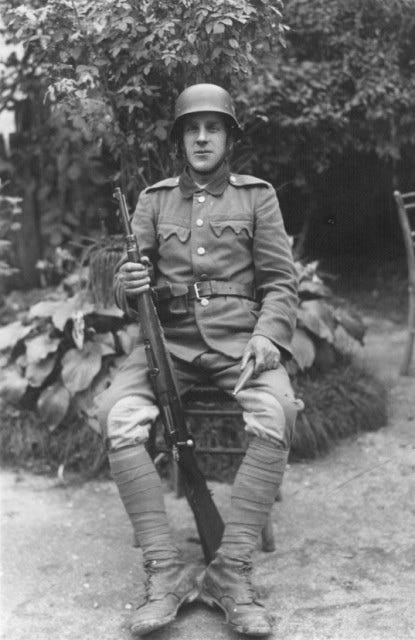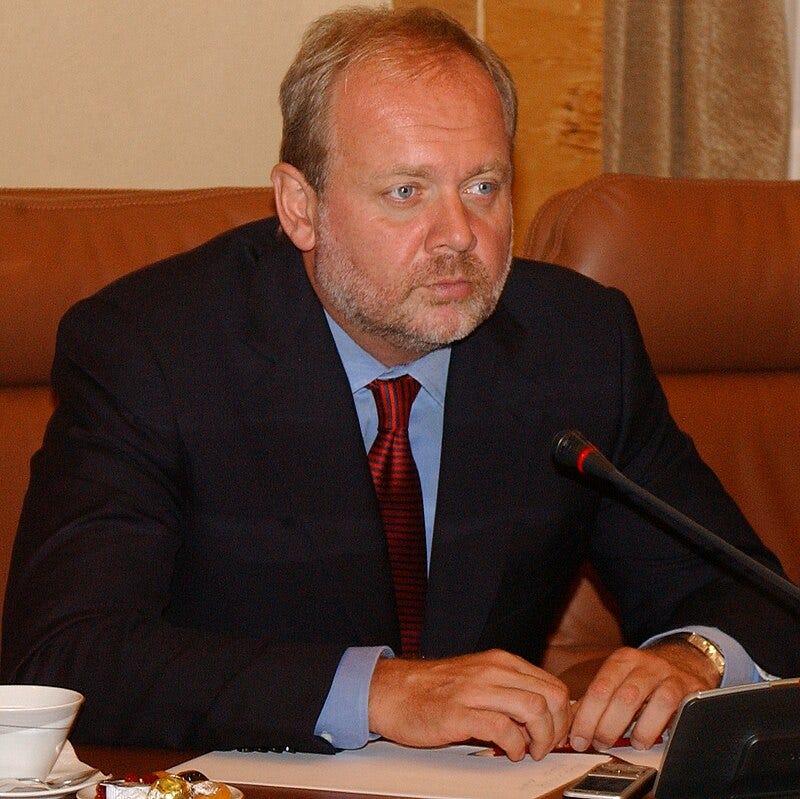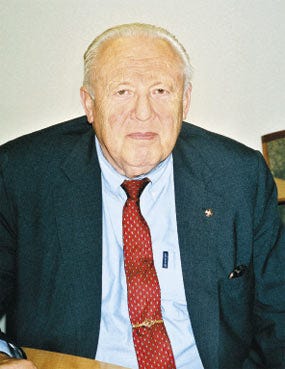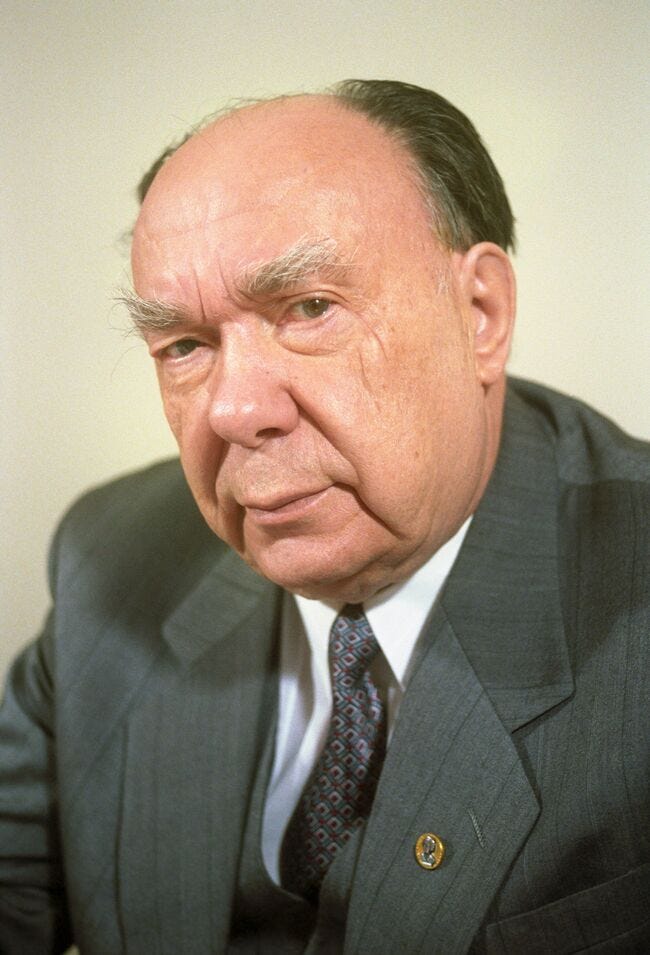The swastika and the cross: Malofeev II
From Operation Barbarossa to 90s shock therapy. Centuries-old clans. Vlasovites and Banderites. The Jordans, the Chavchavadzes, the Bakatins. KGB betrayal. Yakovlev's strategy.
In my introduction to this series, I explained my interest in the figure of Konstantin Malofeev and the network around him. In short, some in Russia believe that under the mask of ultra-patriotic anti-western militarist rhetoric, Malofeev and co are actually set on destabilizing Russia as a coherent strategic enemy to NATO, with the ultimate goal of setting up a pro-western puppet monarchy.
I wrote that before the latest events in the USA - the closure of USAID. While I am also inclined to take some vicarious pleasure in such an event, it’s hard to believe things are quite so simple. What does Marco Rubio, apparently the new head of USAID, mean when he talks of the reality of the ‘multipolar world’? Are figures like Rubio really that eager to ‘abandon US hegemonism’, like some online are claiming?
I liked the analysis of one Mexican patriot on twitter. According to him, USAID has been shut down simply because its efficiency in expanding the US empire has been waning. Liberal humanitarianism has long ago lost its sheen. The ‘independent journalists’ sponsored by USAID consistently fail to gather much of society around them.
Nowadays, he continues, the White House finds more reliable allies in figures like Javier Millei of Argentina. Bulldoze the social state, privatize everything, kill the leftwing opposition, no need for any platitudes on democracy and human rights.
What better context to begin looking at the galaxy of American finance capitalists and cold war hitlerians surrounding everyone’s beloved Russian ultrapatriot, Konstantin Malofeev?
The Jordans
Malofeev the ‘orthodox oligarch’ began his business career in 1996 as a lawyer at the investment bank Renaissance Capital, founded by Boris Jordan.
Here’s how ‘goodreturns’ describes Boris. Quite the list of transnational western investment groups:
Boris Jordan played a significant role in Russia's economic transition to capitalism in the early 1990s. He worked under Bruce Gardner, director of the Russian Center for Privatization, and headed the Moscow subsidiary of Credit Suisse First Boston bank. Jordan's leadership helped make the Moscow office of CS First Boston a leading investment bank in Russia. In 1995, he co-founded the Renaissance Capital investment group with Stephen Jennings.
Jordan became head of Gazprom Media from 2001-2003, when he was ‘forced to resign under political pressure’. Keep in mind that it was precisely in this time period that Vladimir Putin was centralizing power in Russia and getting rid of the most odious figures of the 90s. In 2015, Boris’s brother Nicholas became head of Goldman Sachs Russia.
But like many people I’ll go into in this series, Boris is simply continuing a long family tradition. Originally Germans, the Jordan family spent 400 years serving the Tsarist empire. In the 20th century, the Jordan family entered a new phase of turbulence.
Boris’s grandfather, Boris Mikhailovich Jordan, originally an officer in the Tsarist Russian Imperial Army, had quite the interesting life following his exile at the defeat of anti-communist forces in the Russian civil war:
With the formation of the Russian Protective Corps in Yugoslavia (1941), he held staff positions within it. When the corps was divided into two brigades on May 11, 1942, he was appointed chief of staff of the 1st Brigade under Major General Dratsenko. After the corps retreated to Germany in April-May 1945, he lived for some time in Salzburg, Austria. In 1948–1949, he was appointed head of the 2nd Department of the Russian All-Military Union [the ROVS, a rightwing anti-communist white emigre group]. In the early 1950s, he moved to the United States, where he soon replaced General Bordzilovsky as head of the New York branch of the ROVS. At the same time, he was a member of the Association of the Life Guards Uhlan Regiment and the Page Corps. He passed away on July 20, 1956, in Concord, USA.
The Russian Protective Corps was created by white emigres in Yugoslavia in 1941, right after it had been ‘liberated’ by Nazi Germany. Here is how they described the mission of the unit:
I solemnly swear before God that in the struggle against the Bolsheviks, the enemies of my Fatherland, and against those fighting on the side of the Bolsheviks against the German Army, I will render absolute obedience to the Supreme Leader of the German Army, Adolf Hitler, wherever it may be, and will always be ready, as a brave warrior, to sacrifice my life for this oath.
It comprised white guardist anti-communists like Boris Jordan Sr, who saw their participation in Operation Barbarossa as the ‘continuation of the civil war’. Its glorious activities were limited to guarding Wehrmacht military objects, hence the name. In the context of the war, this meant slaughtering Slavic civilians as part of the ‘struggle against partisan terrorism’.
It was incorporated into the Wehrmacht in 1942, and managed to fight against the Serbian Red Partisans, the Chetniks, and the Red Army. While it saw little success in battle, it was quite lucky in that the western allies decided to give shelter to its men from Soviet justice, unlike many other Russian collaborationists.
Boris’s mother also stayed active while in the US. In a 2001 interview to the US-funded Radio Free Europe, Jordan confirmed that his mother had worked for the very same RFE in the 1950s. In the same interview, Jordan also confirms that he still lacks a Russian passport and remains a US citizen. Defending himself from critics in Russia and abroad, he emphasizes the fact that he and his family are all ‘very active anti-communists’.
But his patriotism only goes so deep. A BBC article titled ‘Jordan: the statesman with a US passport’ wrote that Boris abandoned attempts to become a Russian citizen in 1997 when the ban on foreigners owning Russian companies was cancelled.
One of the reasons I’m interested in the Malofeev network is that so many figures in it remind me a great deal of Ukrainian ones. Nazi collaborationists, anti-communists, relaxing on CIA funds in the US during the cold war, triumphantly returning after the fall of the Soviet Union….
Jordan’s passport situation highlights another parallel. See my article on Ulyana Suprun, who managed to become health minister while lacking a Ukrainian passport. When the pro-western euromaidan revolution took place, Suprun, who comes from an illustrious family of WW2 Nazi collaborators and cold war military industrialists, was flown back to the fatherland.
So what did Boris Jordan think about his family tree? In 2001, Jordan was absolutely clear about his bloodline’s historical mission:
What my grandfather failed to achieve with weapons in hand in the ranks of the White Movement [and the Wehrmacht], I accomplished through privatization.

Jordan’s role in privatization sometimes reached the comical in its historical irony. In 1992, he was a consultant for the Russian Federation’s State Property Commission and participated in in the preparation of the first collateral auctions. He even conducted the first auction at the factory ‘Bolshevik’.
During Jordan’s work at the State Property Commision, he worked alongside the (in)famous shock therapists Egor Gaidar and Anatoliy Chubais. His Russian branch of Credit Suisse First Boston (which he set up in 1992) received from 10 to 17 million vouchers during the scandalous first wave of privatization. These vouchers, acquired for pennies, were then converted into shares of soviet industrial enterprises.
Young Boris seemed to have been programmed from childhood to return home. In 1987, just 21, he graduated from New York University with a bachelor's degree in Russian-American economic relations. His Nazi collaborationist father Alexei complained that he’d been ‘forced’ to work in the US branch of the French Societe Generale bank - ‘all I ever wanted was to be an imperial officer’. It seems that the US Empire saw fit to use the Jordans as agents of economic warfare instead.
Nowadays Jordan apparently prefers the marijuana business, though this was seemingly enough to place him in Bloomberg’s ’ 2019 list of the top 50 most influential people on earth. But the 21st century Boris Jordan is active outside of business. The Jordan family played a major role in the Russian Orthodox Church Outside of Russia, another US-based network I’ll have more to say about in a future article. And in 1999, Jordan created the Foundation for Assistance to Cadet Corps (FACC), named after Alexei Jordan.
Through the FACC, Jordan got access to Russian cadets and other military students. Just as interesting is the vice-president of the FACC - Dmitry Bakatin. Dmitry Bakatin taught the young Konstantin Malofeev law at the Moscow State University in the 90s. And it was Bakatin who originally recommended Jordan hire Malofeev at Renaissance Capital. Bakatin was managing director there.
Traitors in the KGB
The Bakatin family is also worth going into. Dmitry Bakatin’s father, Vadym Bakatin, received a fine position at the well-known US company Baring Vostok Capital Partners in 2001. This may or may not have had something to do with his past.
Abel Bakatin, Dmitry’s grandfather, was arrested and executed as a British spy in 1937. While one might dispute the veracity of such allegations, his son’s activity didn’t help his case much. Vadym Bakatin rose up from being the main engineer in a large factory to a major communist party functionary.
Bakatin then managed to become the last director of the KGB, serving only from August to October 1991, when the KGB was liquidated as an institution. Clearly it was no coincidence that Bakatin was chosen at that moment to lead it. In December 1991, he personally handed over to U.S. Ambassador Robert Strauss the schematics of the listening devices installed in the new building of the American Embassy in Moscow.
Here’s how one Russian military website describes what happened:
However, calling it a "schematic" would be an understatement. It was an entire package of top-secret documentation—no less than 70 pages—detailing the system of listening devices and how they operated. It is said that Strauss stood for quite some time with his mouth agape at the sheer generosity of the Russian minister.
Of course, after a series of unilateral missile reductions and other concessions, the Yankees were no longer surprised by anything. However, for the head of one state's security service to hand over classified documents to a representative of another state as if he were a spy—such an event was unprecedented in the history of covert wars and diplomacy.
Later, Bakatin himself attempted to justify his betrayal by claiming that the eavesdropping system was already outdated and that the Americans had figured it out on their own. Therefore, he argued, handing over the technical documentation did not harm Russia’s security in any way and should be seen as a gesture of goodwill and a step toward mutually beneficial cooperation.
Bakatin then went on to prove himself a hardened ally of everything anti-communist and pro-market in the 90s. He supported Yeltsin against the August 1991 coup attempt. He published memoirs titled ‘Getting rid of the KGB’ and ‘Freedom from Illusions’ - the latter detailed the end of the USSR. He supported Yeltsin in his storming of the white house in 1993.
All in all, the Bakatin family is a curious ally for someone like Malofeev. Malofeev and his orbit generally portray themselves as heroic resisters to the liberal, pro-western Yeltsin regime, barely avoiding dying as martyrs in the 1991 and 1994 events. It turns out that Malofeev’s main patron enthusiastically supported the repression of these ‘true patriots’.
Back to the USSR
Vadym Bakatin was also good friends with Alexandr Yakovlev, one of the most anti-communist figures of the late Soviet Union.
Yakovlev was Gorbachev’s right-hand man in the 80s, constantly urging him to radicalize free market reforms, increase ‘glasnost’ (openness) and ‘perestroika’ (rebuilding).
Unlike Gorbachev, who clung to the image of the naive social democrat do-gooder, Yakovlev was honest about his true aims. This is what he wrote in his preface to the Russian edition of ‘the Black Book of Communism: 95 million deaths’ in 2001. My bolding:
The Soviet totalitarian regime could only be dismantled through glasnost and the totalitarian discipline of the party, while disguising it as an effort to improve socialism.
A long time ago, more than 40 years back, I realized that Marxism-Leninism was not a science but propaganda—both cannibalistic and self-destructive.
Now, this series is about Malofeev and his possible attempts to undermine modern Russia through the tactical use of Russian ultra-patriotism. In this context, it is striking to read these lines from the same preface by Yakovlev. My bolding:
After the 20th Congress, in an extremely narrow circle of our closest friends and like-minded individuals, we often discussed the issues of democratizing the country and society. We chose a method of propaganda that was as simple as a sledgehammer: promoting the "ideas" of late Lenin.
[…] A group of genuine, not superficial, reformers developed (orally, of course) the following plan: to use Lenin’s authority to strike against Stalin and Stalinism. Then, if successful, to use Plekhanov and social democracy to strike against Lenin, and to use liberalism and “moral socialism” to undermine revolutionary ideology altogether.
[…] The Soviet totalitarian regime could only be dismantled through glasnost and the totalitarian discipline of the party, while disguising it as an effort to improve socialism.
[…] Looking back, I can proudly say that the clever yet remarkably simple tactic—using the mechanisms of totalitarianism against the totalitarian system—worked.
Is it not possible to see just such a strategy in the actions of Malofeev and co? Radicalizing the relatively vague state ideology of patriotism to strike at the stability of the state itself? Using anti-western rhetoric with the aim of weakening Russia before its western enemies?
The Chavchavadzes
The last important clan associated with Malofeev is the Chavchavadzes, which is associated with the Saint Basil the Great Foundation (SBGF), set up by Malofeev in 2007.
Keep reading with a 7-day free trial
Subscribe to Events in Ukraine to keep reading this post and get 7 days of free access to the full post archives.






